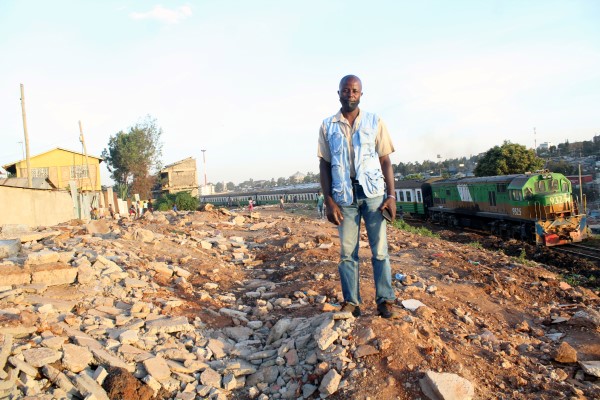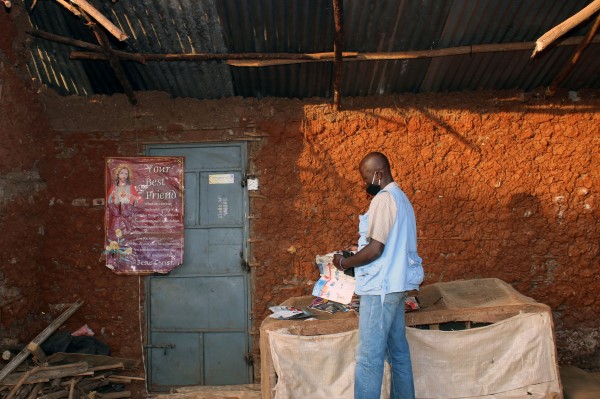On the frontline: Duncan Odhiambo
Millions live in poverty in Kenya, struggling to access basic services such as healthcare or generate an adequate income. Older people are typically among the poorest and most neglected.
Through partners, we have been working to help stop the spread of coronavirus to older people in Kenya. One of the places we have been doing this is in Kibra, Nairobi, which includes Kibera- the biggest slum in Africa and one of the biggest in the world.

On the frontline: Duncan Odhiambo
We spoke to Duncan Odhiambo, a community health worker in the Katwikira village of Kibera. He has been working there for 15 years following a role as a UN-trained peace ambassador. Duncan has suffered his own recent personal loss due to the virus, with his aunt sadly passing away after contracting COVID-19.
Duncan told us that at one point, Kibera had the highest numbers of COVID-19 cases in Nairobi but in recent weeks that number had fallen. He is unsure whether the cases have genuinely fallen or if the lower numbers are because the Government cannot afford testing.
Because the confirmed COVID-19 case numbers have fallen, the Government’s financial support for older people has been reduced and many humanitarian organisations and philanthropists who were supporting older people with food, soap and information have stopped visiting.
In addition to their financial support being taken away, older people are now more worried about coronavirus than ever.
“Since the Government started announcing lower confirmed COVID-19 cases, the general public no longer wear masks, social distancing is no longer being observed and people are not washing their hands as they used to.
“It is a complete reversal of behaviour. Most older people are worried about their health. They are worried that they are no longer a priority in the eyes of the Government.”
Duncan told us that with people relaxing their behaviour, older people are afraid to leave their homes. Those with teenage grandchildren are particularly worried, as they are unable to stop them mixing with friends or having friends visit the home. They are doing their best to follow guidelines, wearing masks and insisting visitors wash their hands before visiting.

Raising awareness, preventing the spread
Through our support, the Kibera Day Care Centre for the Elderly (KCCDE) has been helping older people in Kibera by sharing information on how to protect themselves from coronavirus by distancing and staying healthy. They have also provided masks, sanitisers and soap to older people.
Duncan’s role as a community health worker has included mapping out how many older households there are to help plan the amount of hygiene materials needed and guide where volunteers distribute food.This information was also used by the Government when they initially offered some financial support.
Duncan also received training by the Ministry of Health on how to record and report deaths that occur at home or in a non-hospital facility.
“Personally, I feel older people are a special group of people that need our support, particularly in emergencies such as this one.”
Duncan told us that older people appreciate the work he and the KCCDE are doing. One of them told him that for the first time in his life, he felt cared for as an older person. During COVID-19, the man said he would get three to four visits in a week, a thing that has never happened before.
But it is not easy carrying out these visits. Kibera is largely a slum area. There are no roads or good paths. Duncan and other health workers must walk through precariously built houses, jump over trenches and walk slimy footpaths or corridors. Many of the older people live far apart and it takes a long time to cover such large areas.
“I get satisfaction in knowing that I am helping the vulnerable at such times as this. But it is tough and mentally strenuous, especially when meeting the very vulnerable older people who look to you as their only and last hope when you visit.”
Duncan told us that support is still badly needed. The Government is no longer supporting people, but vulnerable older people need masks, soap and sanitisers.
“Kenya is not out of the woods yet. Your continued support to our older people is very much welcome and I appreciate the fact that this is a global pandemic. However, there is always something someone can do, even if all of us were in dire situations.
It must be remembered that the older people in Kibera are people who have aged without mortgages, they have lived their lives in deplorable conditions and now have no pension and most have nowhere else they can go to for support. They solely depend on well-wishers to survive in Nairobi.”
